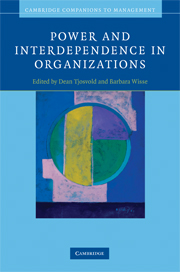Book contents
- Frontmatter
- Contents
- List of figures
- List of tables
- Foreword
- Introduction
- I Relationships to manage the faces of power
- 1 Understanding power in organizations
- 2 How can power be tamed?
- 3 Power and self-construal: How the self affects power processes
- 4 The conceptualization of power and the nature of interdependency: The role of legitimacy and culture
- 5 Power in cooperation and competition: Understanding the positive and negative faces of power
- II Participative leadership: Leading with others
- III Exchange dynamics and outcomes
- IV Power to influence
- V Leading with values
- Index
- References
1 - Understanding power in organizations
Published online by Cambridge University Press: 19 January 2010
- Frontmatter
- Contents
- List of figures
- List of tables
- Foreword
- Introduction
- I Relationships to manage the faces of power
- 1 Understanding power in organizations
- 2 How can power be tamed?
- 3 Power and self-construal: How the self affects power processes
- 4 The conceptualization of power and the nature of interdependency: The role of legitimacy and culture
- 5 Power in cooperation and competition: Understanding the positive and negative faces of power
- II Participative leadership: Leading with others
- III Exchange dynamics and outcomes
- IV Power to influence
- V Leading with values
- Index
- References
Summary
Almost thirty years ago, Rosabeth Kanter (1979) wrote that power was the organization's last dirty secret. She argued that discussions of power and influence were circumscribed both in the workplace and even in the research literature. Asking workplace colleagues or interview respondents questions such as “who (or what department) has the most power” would earn opprobrium rather than praise, something that Salancik and I experienced personally when we began our research on the effects of departmental power on resource allocations in universities (Pfeffer and Salancik 1974). Power, except for occasional discussion of the bases of power (French and Raven 1968), was largely missing from management textbooks and also from the research literature on organizations and management.
Research on power has recently enjoyed some resurgence, particularly in social psychology, as I will discuss below. And although there are now a number of schools that offer elective courses on understanding power and political dynamics inside companies, nonprofits, and government agencies, such electives are seemingly less common than courses on negotiation, for instance. That is the case even though the two topics are highly complementary. Negotiations classes for the most part focus on how to obtain an agreement when interests conflict, how to claim value, and integrative and distributive bargaining over outcomes in circumstances where the parties already have established strengths and weaknesses and interests.
- Type
- Chapter
- Information
- Power and Interdependence in Organizations , pp. 17 - 32Publisher: Cambridge University PressPrint publication year: 2009
References
- 7
- Cited by

